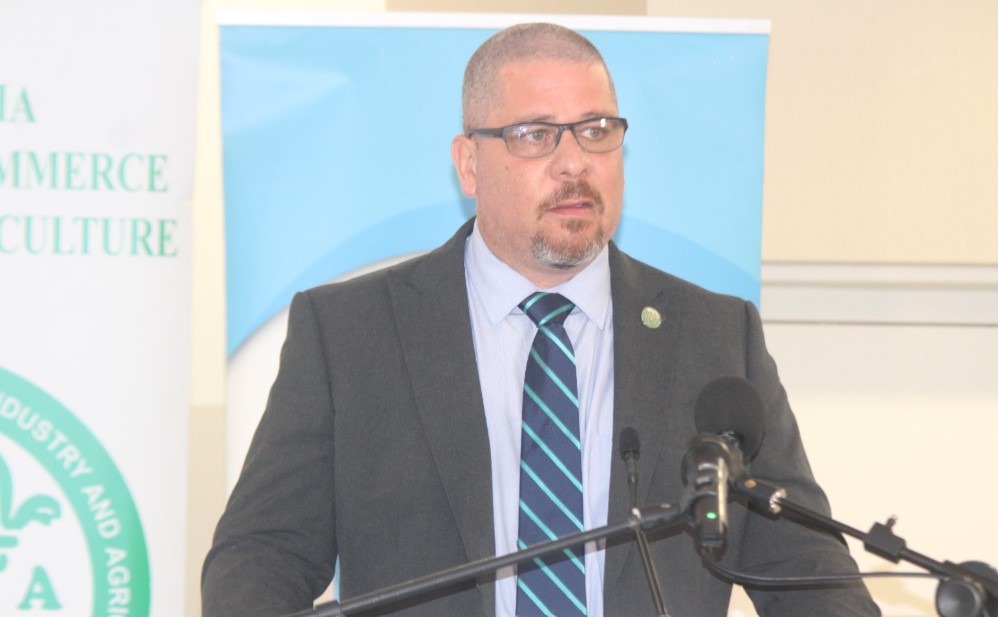

In his address at the 140th Annual General Meeting of the St. Lucia Chamber of Commerce, Industry, and Agriculture, President Mr. Ross Gardner highlighted both the progress made and the challenges faced by the organisation and the business community over the past year.
Speaking at the meeting on Wednesday, Gardner stressed the importance of resilience and collective prosperity in these uncertain times.
“As I end this first year as president of the St. Lucia Chamber of Commerce, Industry and Agriculture, I am pleased that our 140th Annual General Meeting is both defined and driven by the theme ‘Building Resilience and Shared Prosperity in Uncertain Times,’” Gardner stated. “This theme is reflective of our clearly defined mission to foster sustainable business growth and development of our members through strong leadership, strategic advocacy and innovative services, while enabling them to positively impact their communities.”
Gardner acknowledged the numerous challenges confronting local businesses, ranging from law and order issues to human resource shortages and aging infrastructure. He emphasised that addressing these concerns is critical for the economic growth and prosperity of the country. “Such inadequacies restrain economic and commercial growth, redressing them should concern us deeply if we are to propel this country forward in balanced and sustainable ways,” he said.
The president also expressed confidence in the leadership of the Chamber’s executive team, stating that the trust given in 2023 had been well-placed. He commended the Chamber’s board for staying the course set in their 2022–2025 strategic plan, which remains focused on the core needs of the business community.
This includes continuous advocacy efforts at all levels of government, aimed at creating a more conducive environment for business. Gardner stressed that effective advocacy requires “consistent, persistent, meaningful engagement,” with many efforts taking place behind the scenes, often in a strategic and unseen manner.
A central issue that has been a focus of the Chamber’s advocacy efforts is the rise in crime and violence in Saint Lucia. Gardner highlighted that crime abatement requires a multifaceted strategy, and the Chamber has long called for a “cradle-to-grave” approach to address crime at all levels.
He acknowledged the government’s recent efforts in training police recruits and providing much-needed equipment, but urged further investment in both personnel and resources.
Gardner also addressed the importance of securing Saint Lucia’s borders, particularly to combat the influx of illegal firearms and ammunition, which contribute to the country’s high crime rates. He called on the government to prioritize the procurement of scanning technology for ports of entry to curb this issue.
Turning to infrastructure, Gardner noted the critical role played by the St. Lucia Air and Sea Ports Authority (SLASPA) in the nation’s economic engine. He called for urgent investment in upgrading the authority’s aging infrastructure, stressing that its deficiencies result in higher costs for businesses and consumers alike.
In his address, Gardner also spoke about the Chamber’s commitment to fostering deeper, more meaningful dialogue with government agencies. He emphasized that this dialogue must go beyond superficial consultations and focus on genuine partnership, mutual respect, and inclusion.
He reflected on positive experiences, such as the Chamber’s engagement with the Inland Revenue Department on tax reforms and with the Ministry of Commerce on the Trade License Bill, noting that these discussions allowed for constructive feedback and improvements in policy.
In contrast, Gardner expressed disappointment with the process surrounding the recent minimum wage order, announced without adequate consultation with the private sector. “The lack of opportunity for constructive input during the formative stages of this order has led to unforeseen impacts that could have been easily anticipated, addressed and mitigated in the best interest of all,” he said.
Looking ahead, Gardner proposed the establishment of an annual National Development Forum or roundtable to allow the private sector and other civil society actors to engage meaningfully in discussions leading up to the national budget, which he believes, would ensure that businesses are not excluded or unfairly burdened with the costs of national development.





